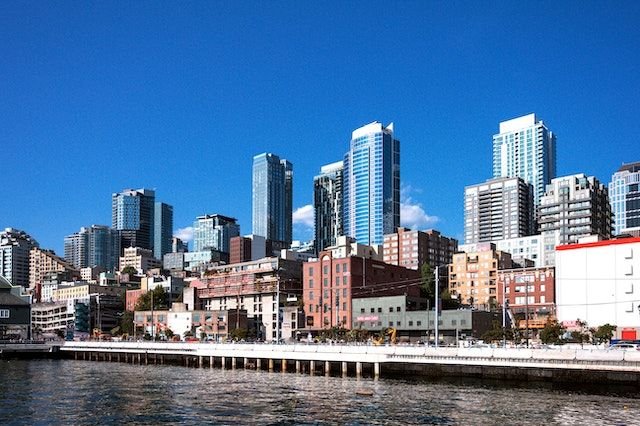When considering a move to the historically rich and diverse state of Massachusetts, many face the pivotal decision of choosing between the urban vibrancy of cities or the tranquil appeal of its suburbs. Each offers its unique lifestyle, with many benefits tailored to different individual preferences. Understanding these differences is crucial as you contemplate moving to Boston or one of the picturesque towns surrounding it. After all, settling in an environment that aligns with your personal and professional goals is key to ensuring the right fit for your Massachusetts lifestyle.

The Allure of Urban Living
With its bustling cities and historic charm, Massachusetts presents a unique urban allure. Understanding the pros and cons of living in cities like Boston is crucial for those drawn to a city’s heartbeat. Dive in as we explore the facets of urban living in this New England gem.
Pros of Urban Living
Vibrant Social Scene: Massachusetts’ cities, especially Boston, are bursting with a dynamic social scene. From art exhibitions to music festivals, there’s always something happening. The opportunity to meet diverse groups of people and engage in varied activities is unparalleled.
Proximity to Work Opportunities: Many of the state’s top employers and industries are in urban centers. This proximity can significantly reduce commute times, allowing more personal time. The cities offer vast networks and opportunities for those who prioritize career growth.
Cultural Richness: Living in an urban setting means easy access to cultural events, renowned museums, and theaters. It’s a haven for those who appreciate the arts and wish to immerse themselves in cultural experiences.
Cons of Urban Living
Noise and Pollution: As with most cities, Massachusetts’ urban areas aren’t exempt from higher noise and pollution levels. While invigorating for some, the hustle and bustle can be a deterrent for others seeking tranquility.
Elevated Cost of Living: While cities offer many amenities, they often come with a steeper price tag. Living in the city’s heart may require a more substantial budget for housing to daily expenses.
Limited Personal Space: Urban settings often mean smaller living spaces and the potential for crowded conditions. That can be a significant consideration for those yearning for sprawling backyards or quieter neighborhoods. Furthermore, when moving, hiring reputable movers in Massachusetts becomes essential to navigate the tight streets and efficiently move into compact spaces.
Urban living offers a rich tapestry of experiences full of opportunities and excitement. However, like all choices, it comes with its set of compromises. The decision to embrace city life should weigh these pros and cons, ensuring it aligns with personal preferences and lifestyle aspirations.
Finding the Right Fit for Your Massachusetts Lifestyle: Embracing Suburban Serenity
While the allure of cities is undeniable, the serenity and charm of its suburbs have a magnetic pull of their own. As we step away from the urban hustle, a tapestry of green landscapes, tight-knit communities, and spacious homes unfurls. Let’s delve into the tranquil appeal of suburban Massachusetts, highlighting the best of what towns have to offer
Pros of Suburban Living
Spacious Homes and Yards: One of the undeniable perks of suburban living is the space it affords. Large backyards for barbecues, spaces for children to play, or simply a serene garden for relaxation are standard in many suburbs.
Safety and Community Spirit: Suburban areas often boast lower crime rates, providing families with safety and security. This safety, combined with the community-driven events and gatherings, fosters a unique bond among residents. Neighbors often become extended family, celebrating milestones and festivals together.
Parks and Recreational Areas: The abundance of green spaces is another hallmark of suburban life. Parks, hiking trails, and recreational areas are abundant, offering a respite from screen time and an opportunity for physical activity. Some of the best neighborhoods in Gloucester for instance, offer scenic vistas and walking paths for residents and visitors alike. So If this is something you are looking for, local moving experts can help you settle down.
Cons of Suburban Living
Longer Commutes: While the suburbs offer peace, they often come with longer commute times to city centers or major employment hubs. For those working in urban areas, this added travel time can significantly affect daily routines.
Limited Nightlife and Entertainment: While the suburbs have their events and gatherings, they may not match the diverse entertainment options found in cities. The suburbs might feel limited for those who crave late-night venues, live music, or many dining options.
Potential Feeling of Isolation: The spaciousness and tranquility of the suburbs can sometimes translate to feelings of isolation, especially for those used to the ever-present hum of city life. However, with its bustling village centers and community events, towns do their best to combat this with a balance of serenity and activity.
The suburbs offer a unique blend of tranquility, space, and community spirit. They cater to those seeking a quieter pace of life without compromising on essential amenities. When considering suburban life, balancing the serenity and spaciousness against potential commute times and entertainment options is essential, ensuring it truly mirrors your ideal lifestyle.
Transportation and Commute: Making the Move Smooth
Navigating Massachusetts requires a blend of planning and flexibility. While urban areas offer extensive public transport options, suburban life might lean more on personal vehicles. The daily commute plays a pivotal role in influencing lifestyle choices. Therefore, whether you’re hopping on Boston’s T system or driving from picturesque suburbs, ensuring efficient and stress-free transit is essential. As you evaluate locations, considering the balance between transportation convenience and commute times will guide you toward the right fit for your Massachusetts lifestyle.
Cost of Living and Budget Considerations
Living in Massachusetts brings diverse financial landscapes. Urban settings often command higher living costs, from rent to dining out, while suburban areas might offer more homes for the dollar but come with added commuting costs. Balancing your budget involves more than just housing; it’s about aligning expenses with lifestyle priorities. Whether it’s the allure of city life or the charm of suburbs like Newton, understanding the financial implications of your chosen environment is essential to thriving in the Bay State.
Quality of Life Metrics to Consider
In choosing between urban and suburban Massachusetts, it’s vital to weigh factors beyond the tangible. Safety, educational opportunities, healthcare access, and the overall pace of life are integral to well-being. Do you thrive in the lively pulse of the city or find solace in the measured rhythm of the suburbs? Reflecting on these quality-of-life metrics, alongside personal values and aspirations, will illuminate the path to your ideal setting.
In Conclusion
Massachusetts offers a beautiful tapestry of living experiences. Whether you’re drawn to the dynamic cities or serene suburbs, finding the right fit for your Massachusetts lifestyle is crucial. By evaluating costs, commute, and quality of life metrics, you can carve out a space that feels like home in the Bay State.










